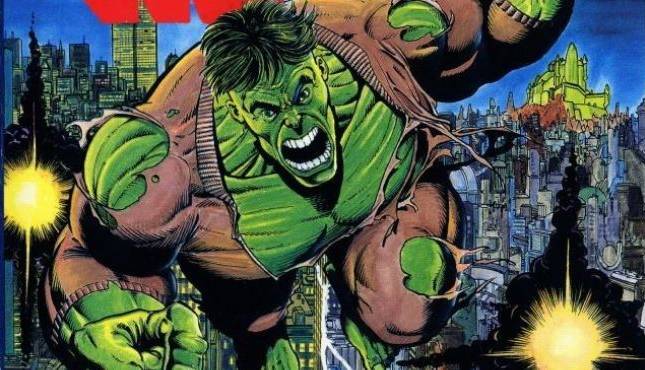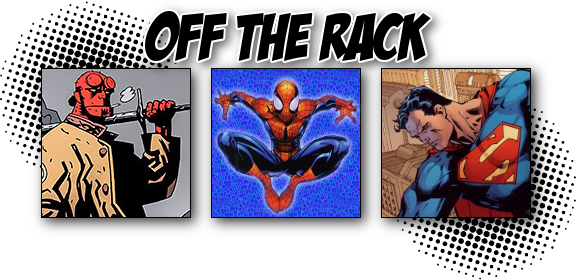Movies & TV / Columns
Off The Rack Volume 45: Incredible Hulk – Future Imperfect


I miss when Peter David wrote the Hulk.
I get into this with my podcast cohorts a lot, because I feel like any Hulk not written by Peter David is not a Hulk to care to read. I feel like they are always coming up to me and saying “There’s a new Hulk book coming out! Check out this radical idea they are rolling out: Hulk… is a monster. And he might not be a good guy!” The Hulk is as one-note of a character as there has ever been, and it feels like they’ve been telling variations on the same story of him for fifty years, but… isn’t that what it ALWAYS boils down to for him? He needs to be contained; he needs to be stopped. He sometimes does good, but more often than not, he’s a rampaging monster who is out of Banner’s control. Let’s shoot him either into space or through the eye with an arrow, but it never matters, because he just comes back. Watch out, he’s angry because of the last crappy thing he did to him when he was angry! We better do a crappy thing to him and see if it works out better this time!
Serialized storytelling has not always been this character’s friend because you can only put so many pretty hats on the same plain girl before you’re like, “Yeah, it’s that same girl in a new hat”.
Jesus, that was terrible. This is what reading Hulk comics does to you, though! Metaphors fail you.

TITLE: Future Imperfect
Writer and Artist: Peter David and George Perez
Publisher: Marvel
Protagonists: The one, the only, the incredible Hulk!
Antagonists: The one, the only, the incredible Hulk!
Future Imperfect is Peter David and George Perez’ story from the 1990’s involving a dystopian future where, after a nuclear apocalypse, the Hulk has mutated into the even more powerful and cunning Maestro, the ruler of one of the few pockets of humanity left in the war’s wake. The denizens there all speak one of those weird, over-the-top slangs that Peter David loved coming up with for futuristic stories (what-the-shock-ever, you know it’s true; read Spider-Man 2099), and they find and use Dr. Doom’s time machine to retrieve the 616 Hulk to deal with his counterpart. Which is weird because there are so many other heroes in any era they could have chosen.
As they fight, Maestro proves to be more than a match for the then-modern Professor Hulk—he even breaks Hulk’s neck at one point and leaves him alive to try and Dark Side him over to be his co-ruler—until Banner is ultimately only able to stop his foe by tricking him onto the aforementioned time machine and sending him back to ground zero of the original gamma bomb detonation. Not sure why the detonation that CREATED the Hulk would KILL the Hulk, but hey. It’s a resolution.

It’s extremely hard to write about “possible futures” for characters that you don’t own and whose adventures will continue for decades after you leaves the book, but Marvel writers always give it a shot. The premise of the Maestro is that he is an even more irradiated, madder version of the Professor Hulk that Peter David had given us, but that version of Ol’ Periwinkle Pants hasn’t been around in ages. And that does leave the book feeling dated somewhat. Rick Jones as an extremely old great grandfather plotting against his former partner is also a bedrock of this story’s plot, and… jeez. I have no idea where Rick Jones even is in Marvel these day. Seriously, the last I remember he was A-Bomb, but that can’t possibly still be the case, right?
I’m seriously putting this article aside so I can Wikipedia Rick Jones now.
Whisperer? Learns skills super fast now? Okay, if you say so, Wikipedia.
Anyway, the story is brief, clocking in at just over 100 pages total across two issues, and it feels like a breeze. Compare that with Age of Ultron which I reviewed months ago and was 10 issues and become increasingly meandering and directionless as it went on. While I would like to have seen this idea of a corrupt Hulk ruling over the future go on a bit longer and feel more weighted than what we got, at least it didn’t turn into AoU and become an unfocused, confusing mess. There’s got to be a happy medium here sometimes, though. Another 25-30 pages showing Maestro’s actual rise and the process by which he convinced himself what he was doing was right couldn’t have hurt. Or, if not that, maybe some build of Jones’ forces going up against those loyal to Maestro.
But as it is, the yarn is punchy and, even in its brevity, set up the shadow of Maestro as a looming figure over every decision Hulk made for quite some time. He remained in enough prominence that he was brought back as one of the Battleworlds in Secret Wars, and David journeyed back to the character during his modern run on Spider-Man 2099. The idea certainly had some legs.
Talking Point: Evil twins! Oooo… scary, naughty versions of the heroes we have come to love! Who is the best evil twin in all of comics?
And while you’re thinking on that, if you want to enjoy more comic book related blogs and a weekly podcast, visit Ghosts of the Stratosphere. Our podcast is full of debates, top ten lists, and comic reviews, and we update daily!
https://www.youtube.com/watch?v=ATDnPRU6B24
You can also follow us on Twitter, @gotstratosphere for updates!








